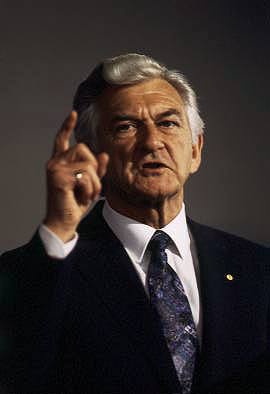
28th PRIME MINISTER
11 MAR 1983 - 20 DEC 1991

"The man most wanted as Prime Minister."
Everyone agreed the new man at The Lodge had 'charisma'. Some thought he qualified as a 'folk hero'. Certainly, Bob Hawke's style was in sharp contrast to the seemingly aloof and reserved Fraser. Here was an outgoing, down-to-earth Prime Minister, with a zestful enthusiasm for his new role.
Sports-loving, spontaneous, sparkling with derisive wit, warm-hearted, worldly yet unpretentious, he came over as the kind of man you'd like to meet at a Sunday barbie. As a hard-drinking young man he won the world's record (12 seconds) for sinking 21/2 pints of beer. He is an extrovert who can weep in public, exclaim "Jesus Christ!" when a bulb explodes during a television interview or a golf shot goes wrong, and say of women, "I love all of them". In Parliament, he has a gamecock fierceness which "rips the guts out of the Opposition" in an Aussie accent beloved by imitators.
And yet, during his first 28 years of life, he seemed to be headed for an obscure career as an academic and Labor theorist. An excellent student - and cricketer, schoolyard brawler, drinker and punter - he topped his class in primary school, sailed through the academically prestigious Perth Modern School, graduated in Law and Economics from the University of Western Australia and won a Rhodes Scholarship to Oxford University. In 1956 he accepted a doctoral research scholarship at the Australian National University and undertook research for the Australian Council of Trade Unions.
The turning point in his career came in 1958 when he turned down a lectureship at Canberra University College in favour of an ACTU post as researcher and wages tribunal advocate.
He had already come a long way, by his own abilities, from childhood in Bordertown, South Australia, where he was born in 1929. His father was the Congregational minister there and later in a Perth suburb. Hawke spent his formative years in the narrow environment of country and suburban life of that era and in the disciplined atmosphere of a Nonconformist parsonage. Later he reacted by becoming a drinker and an agnostic. An uncle, Albert Hawke, who was a member of the Labor Party, became his political mentor and at 17 Bob Hawke joined the party.
As an ACTU official, Hawke quickly built a reputation as a top-level negotiator and developed political aspirations. He made his first bid for a federal seat in 1963. When he failed, he declined offers of a safe ALP seat and concentrated on building a power base in the ACTU. By 1973 he was president of the ACTU, national president of the Labor Party and well regarded in the international labour movement. Believing trade unions to be instruments of social reform, he revitalised the ACTU and broadened its horizons. By the mid-1970s he had achieved a high public profile as a man of good sense and goodwill, with the tact and moderation which often averted crippling industrial disputes. A 1975 poll declared him: "The man most wanted as Prime Minister"
Hawke moved into federal politics in 1979, with a safe Labor seat in Parliament. Three years later he challenged Bill Hayden's leadership of the Parliamentary Labor Party. He lost by six votes, but his vivid personality, ruthless attack and strong public image made party power-brokers see him as the man most likely to topple Fraser.
Hayden stepped aside in February 1983. In four weeks of furious campaigning, Hawke led the party to victory in the March elections. His electoral promises included an end to Fraser's "almost perpetual recession" a centralised wage-fixing system and national reconciliation between employers and unions.
Initially many people saw Hawke as a new Messiah, leading them back to the first glamorous year of the Whitlam reform era. Actions such as blocking a Tasmanian hydro-electric scheme, on environmental grounds, won wide acclaim. But disenchantment set in when it became apparent that reforms had to be paid for. Hawke and his Treasurer, Paul Keating, soon began to sound like Fraser in their demands for financial belt-tightening. Tax on superannuation, the Medicare levy, charges for tertiary education, the assets test on age pensions, a capital gains tax, welfare cuts and other measures cost Labor much of the credibility which won the 1983 elections. The export of uranium angered anti-nuclear activists, and an ID card, proposed as a trap for tax and welfare cheats, offended many Australians with its 'police state' implications. The card proposal was later dropped.
But the Opposition was in such disarray, from leadership contests and then the collapse of the Liberal-National Party coalition, that in the 1984 and 1987 elections Labor still seemed the only viable alternative.
Hawke's sincere belief in the creation of a fairer and better Australian society cannot be doubted. Perhaps the trouble is that his charisma led people to believe he could deliver painless solutions to Australian problems. The pressures of his task have made him sterner, greyer, crankier, craggier, but he still retains the aggressive optimism which inspires his supporters.

http://www.oocities.org/CapitolHill/5557/hawke.html
This page last updated on 01 Feb 01
© Robertsbridge and Langlen
The following advertising was randomly placed by GeoCities,
and does not necessarily reflect
my personal interests, attitudes, opinions, or endorsements.
But it DOES keep those annoying pop-up ads off of my pages!
THANK YOU FOR STOPPING BY!